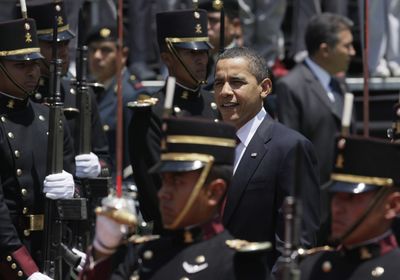Obama sidesteps on weapon ban
Mexican president pushes for renewal of assault gun law

MEXICO CITY – President Obama and his Mexican counterpart, Felipe Calderon, outlined a common approach Thursday to combating drug violence, climate change and trade disputes but appeared to part ways over the urgency of reinstating a U.S. ban on assault weapons.
On his first presidential visit to Mexico, Obama praised Calderon for taking on the drug cartels, whose potent arsenals and economic power are threatening the integrity of the Mexican state. Obama announced that he will push the U.S. Senate to ratify an inter-American arms-trafficking treaty designed to curb the flow of guns and ammunition to cartels and other armed groups in the hemisphere.
But Obama indicated that while he favors reinstating the U.S. ban on assault weapons, which Congress allowed to expire five years ago, the move would face too much political opposition to happen soon. He said better enforcing existing laws and increasing U.S. vigilance on the border to prevent arms smuggling, as his administration has begun to do, would have a more immediate effect on stopping U.S.-made weapons from reaching Mexico’s cartels.
“I believe we can respect the Second Amendment of the Constitution … and curb the flow of assault weapons to Mexico,” Obama said at a news conference with Calderon at Los Pinos, the presidential compound. “None of us are under the illusion this would be easy.”
Calderon said drug violence has soared since the assault-weapons ban expired. He said he favored a solution that “respects the Second Amendment … but prevents abuse of the right by criminals.”
“The crime is not just in Mexico,” he said. “The crime is in the United States.”
Obama’s visit, the first by a U.S. president to the capital since Bill Clinton’s stop here in 1997, represents a show of support for Calderon, who two years ago became the first Mexican president to fully deploy the army against drug cartels that supply an enormously lucrative U.S. market.
Since then, more than 10,000 people have died in drug-related violence. The Bush administration won approval of a three-year, $1.4 billion counternarcotics package for Mexico and some Central American countries last June, but the military hardware has been slow in arriving. Obama pledged to expedite its delivery.
The two men expressed confidence they would resolve a trade dispute originating in a vote last month by the U.S. Congress to cancel a pilot program allowing Mexican truckers on U.S. highways, as permitted by the North American Free Trade Agreement, or NAFTA. They emphasized the need for comprehensive immigration reform.
And they announced a new partnership to promote clean energy and reduce greenhouse gases in both countries by sharing academic research and promoting alternative energy sources such as wind and solar power along the border, among other measures.